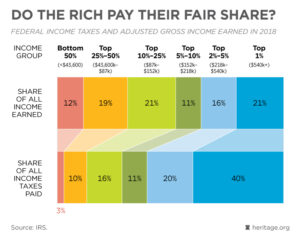Part two of a two-part series.
Spending on entitlements is mandatory, but paying for them is often pushed into the future. In spite of all the tax revenue used to pay for them, entitlements account for most of the $28 trillion in federal debt, as well as the more than $150 trillion in unfunded liabilities, we’ve accumulated.
Servicing this debt is affordable today, because interest rates are near zero and the Federal Reserve Board is rolling over debt incurred many years ago, when interest rates were higher. Still, as debt continues to accumulate and as interest rates rise, the cost of servicing the debt could run into the trillions of dollars.
Meanwhile, retiring baby boomers will be putting additional strain on the system as they begin collecting Social Security and sign up for Medicare. Social Security is a pay-as-you-go program. As we’ve previously noted, “Over the next 30 years, the Social Security system will collect $52 trillion in payroll taxes and other … revenues and spend $74 trillion on benefits.”
In other words, your kids will be paying for today’s out-of-control spending.
A Negative Return on Investment
Before adding more entitlement spending, it would be worth asking whether existing entitlement spending has been worth the investment. What do we get in return?
The New Deal may have caused the Great Depression to last longer. In the 1960s, the War on Poverty did little to reduce poverty and created single-parent households.
We previously noted that the War on Poverty, which created many of the government programs that still exist today, has cost $20.7 trillion (based on 2011 dollars) and yet 15% of Americans continue to live in poverty — the same percentage as when the War on Poverty began.
And since the beginning of the War on Poverty, marriage has declined sharply, according to the Heritage Foundation. In 1964, 7% of U.S. children were born outside of marriage. Today, 41% are born to unmarried couples. More than two-thirds of all poor families with children in the U.S. are headed by single parents.
Why the huge increase? The Heritage Foundation notes that welfare reduces benefits when low-income couples marry.
Entitlements are also inequitable. At a time when “equity” is touted as a federal goal, the government is seeking to create new entitlements that will benefit some Americans and not others. Even if you’ve already paid for your kids’ college education, you may soon be paying for someone else’s kids to attend college. You’ll also be paying for child care, family leave and other benefits that you won’t be able to take advantage of if your children are grown or if you have no children.
By increasing dependence on federal government, entitlements also reduce freedom. Over time, as more Americans come to depend on entitlements, the federal government will become ever-more powerful. Nobel prize-winning economist Friedrich Hayek argued that centralized economic planning inevitably leads to totalitarianism.
He’s been right so far.
So why create more entitlements? They’re something bright, shiny and expensive to hang in front of potential voters. And many voters are all for new entitlements, as long as you claim that they will be paid for by “the rich.”
